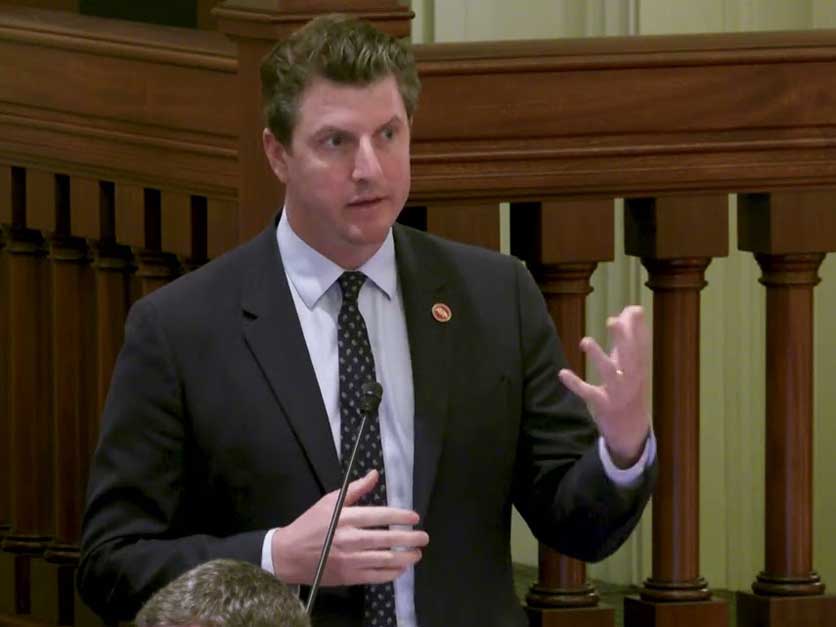Two bills in the California Legislature are proposing ambitious climate reporting mandates for companies throughout the supply chain. The legislation would potentially layer on more costs and paperwork for farmers, ranchers and food companies and stands to usurp federal, international and voluntary efforts already underway.
“Coming right out of the pandemic, things are just now getting to semi normal on the supply chain side,” Matthew Allen, vice president of state government affairs at the Western Growers Association, told Agri-Pulse. “This was another wrench thrown into this in a completely unnecessary way.”
Senate Bill 253 by Senator Scott Weiner of San Francisco would require large corporations to disclose their climate impacts, including indirect emissions within the value chain.
A companion bill, SB 261 by Sen. Henry Stern of Canoga Park would apply to more than 10,000 companies earning more than $500 million in annual revenue and task them with preparing climate risk reports. According to Sarah Sacks, a policy advocate for the environmental nonprofit Ceres who testified in support of the bill, the reporting would fall within two categories. Transition risks encompass emerging regulations, technologies and legal risks, while physical risks would be wildfires, floods, chronic drought and water shortages. Stern noted during a hearing that “a company that sells ketchup is going to have very different risks than a company that sells shoes.”
The lawmakers have been rallying to build a consensus among their colleagues in the Capitol as the final days of session wind down.
 Sen. Henry Stern, D-Canoga Park
Sen. Henry Stern, D-Canoga Park“People just say to cover your ears, close your eyes, pretend there’s not a hurricane in August, pretend there’s no bomb cyclones, pretend there’s no climate risk and we’ll all be fine,” said Stern, during a press conference last week on the Capitol steps that featured a bean bag chair decorated as the planet and strapped to a hospital stretcher. “That kind of self-blinding is not just going to hurt California’s economy, workers, organized labor everywhere in the state—but across the country.”
Lobbying on behalf of Wiener’s SB 253 is a tech firm selling emission tracking software to businesses. According to Kristina Wyatt, deputy general counsel and chief sustainability officer at Persefoni AI, companies would adhere to a variety of reporting levels under the proposal. Trucks would fall under Scope 1 emissions within the international reporting protocol. Electric use at facilities would be Scope 2 and the supplies for manufacturing products would be Scope 3. Wyatt argued the state should take the lead on this front.
“There is no region better suited to drive this in the U.S. than California,” said Wyatt, in a committee hearing on the bill. “California has a history of forward-thinking climate initiatives.”
Melanie Morelos, a senior program manager at The Greenlining Institute, asserted that small businesses and farms would not be burdened with the requirements to calculate and report emissions and would instead rely on “proxies and other mechanisms in place.” Companies would have until 2027 to begin reporting the Scope 3 emissions in the supply chain.
Both measures face steep opposition from a broad business coalition led by the California Chamber of Commerce and joined by several farm groups. CalChamber policy advocate Brady Van Engelen argued SB 253 would not lead to emission reductions and runs counter to the Air Resources Board’s existing inventory process for counting climate emissions—considered one of the world’s most comprehensive regulations.
Don't miss a beat! Sign up for a FREE month of Agri-Pulse news! For the latest on what’s happening in agriculture in Washington, D.C. and around the country, click here.
“The bill’s requirements are misaligned and only generate significant costs, with little or nothing to show for in terms of transparency or in terms of emission reductions,” said Van Engelen, adding that information shared by farmers and others along the supply chain could be used inappropriately.
He stressed that longstanding voluntary efforts to report emissions should remain voluntary and argued both bills would lead to larger companies ending contracts with smaller businesses, stalling their growth and risking job losses.
Robert Spiegel, a policy director at the California Manufacturers and Technology Association and former California Farm Bureau advocate, called it a “wide-ranging mandate for all California companies and beyond.” He worried it would generate “pages upon pages of information” that carry inaccuracies and irrelevant information.
Spiegel detailed the many steps in reporting Scope 3 emissions for making a t-shirt. The manufacturer, for example, would report on the agricultural practices for growing the cotton to provide the raw material. The energy used in fabric mills and sewing facilities, the fuel for transportation and the consumer method for washing and drying the garment would all be part of the reporting, he argued.
A committee analysis warned that parts of SB 253 would duplicate federal efforts underway. In March the Securities and Exchange Commission announced plans to standardize climate-related disclosures for investors, an action immediately challenged by Republican lawmakers. SEC Chairman Gary Gensler acknowledged the commission had received significant pushback on Scope 3 disclosures since it initially proposed the requirements early last year.
Stern said the vigorous lobbying by the U.S. Chamber of Commerce against the SEC is the reason why California should pass both SB 253 and SB 261.
“It's that sort of aggressive lobbying tactic we've seen from the national banking and securities industries that has forced us into a position where we've got to now jump in,” he said. “A national fix would be a really good thing. We just can't afford to play the waiting game.”
Both measures await a key decision in the Assembly Appropriations Committee this week. Stern’s previous attempt to pass legislation similar to SB 261 was held in an appropriations committee last year, while Wiener’s high-profile bill last year on corporate climate disclosure failed to garner enough votes in the waning hours of session to pass out of the Assembly.
For more news, go to Agri-Pulse.com.


